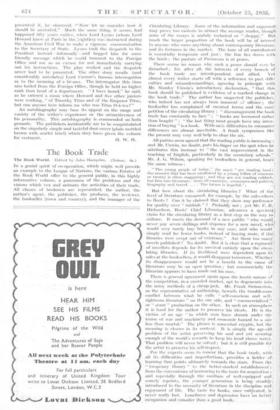The Book Trade
The Book World. Edited by John Hampden. (Nelson. Os.)
IN a genial spirit of co-operation, which might well provide an example to the League of Nations, the various Estates of the Book World offer to, the general public, in this highly informative volume, a panorama of the problems and the visions which vex and animate the activities of their trade. All classes of boOlunen arc represented," the author, the author's agent, the publisher, the producer, the reviewer, the bookseller (town and country), and the manager of the
Circulating Library. :Some of-the information and argument. May prove too "esoteric to attract the average, reader, though none of the essays is unduly technical or " shoppy." But Much the larger proportion of the book will be of interest; to anyone who cares anything about contemporary literature,
an, d its fortunes in the market. The tone of all contributors IS essentially temperate and just ; the lion lies down with
the lamb ; the pasture of Parnassus is at peace.
There seems no reason why such a peace should ever be disturbed ; Rir, after all, the interests of every branch of the book trade arc interdependent and allied. Yet
almost every- writer starts off with a reference to past dillH cultics and misunderstandings, agreeing in principle with Mr. Stanley Unwin's introductory declaration, " that this book should he published is evidence of a marked change in the book trade." The author has suspected the publisher,' Who indeed has not always been innocent of offence ; the bookseller has . complained of sweated tereas. and the co- petition of the circulating 'library " discourageMent the book trade has constantly to face ''• ; " books arc borroWed rather than bought " " the last thing most peOple haVe any inten- tion of buying " is a book. With such difficulties to encounter differences are almost inevitable. A frank symposium like the present' may very well help to clear the air. •
All parties seem agreed that the reading public is increasing ; and Mr. Unwin, no doubt, puts his finger on the spot when he attributes this increase to " the vast improvement in the teaching of English, particularly in the secondary schools.' Mr. J. G. 'Wilson, speaking for booksellers in 'general, bearS the.same witness :
" The young people of today," (he says) " are reading hard; the amount that has been swallowed by a young fellow of nineteen or twenty is often staggering ; and they are not reading rubbish, but first-rate literature—from all countries--economies and polities,
biography and travel. . The future is hopefid.".
' But how about the circulating libraries ? What of the level of literature consumed, for example, by the subscribers to Boots ?. Can it be claimed that they show any preference' for quality over " rubbish "' PrObably not ; yet Mr. 1". Richardson, Boots' Chief Librarian, advances a specion411 claim for the circulating library as a first step on the way te, is Culture. It meets the demand of a new public " who woug never pay seven shillings and sixpence for a new novel, Whn,. would very rarely buy' books • in any ease,' and who would, simply read far fewer books, instead of buying more, if elite libraries were swept out of existence." Are there.loo many novels published ? No doubt. But it is clear that a regiment, of novelists depends for its survival entirely upon the hating libraries. If its livelihood were dependent upon its sales at the booksellers, it would disappear tomorrow. Whether its disappearance would not be a benefit to the cause of literature may be an open question.; but commercially the
librarian appears to have made out his case. •
There is general agreement again upon the hectic nature of tlsc competition, in,a crowded market, apt to degenerate into the noisy methods of a cheap-jack. Mr. Frank Swinnerton, as the representative, of authorship, bewails the troublesoMe conflict between what he calls " self-conscious and self • righteous literature " on the one side, and " commercialised:" or." stunt " production on the other. In such an atmosphere it is hard for the author to preserve his ideals. He is the victim of an age " in which men have shrunk under the terror of war and machinery and economic hazard to a size less than mortal." The phrase is somewhat cryptic, but the meaning is clearer in its context. It is simply the age-old problem of the artist preserving his soul and yet securing enough of the world's rewards to keep his head above water. That problem will never he solved ; but it is still possible fur the artist to preserve his self-respect.
For t he experts seem to concur that the book trade, with • all its difficulties and imperfections, provides a ladder of learning that points ultimately towards the stars. From tWt • twopenny library " to the better-stocked establishment ; from the convenience of borrowing to the taste for. acquisition ; and especially through the • .inedium of well-equipped and comely reprints, the younger generation is being steadily introduced to the necessity of literature in. the. discipline Mid enjoyment of life. The taste for books, once cultivated, is never really lost. Loneliness and depression have no better coaipanion and consoler than a good hook.


























































 Previous page
Previous page